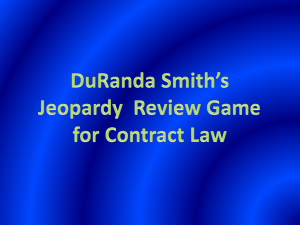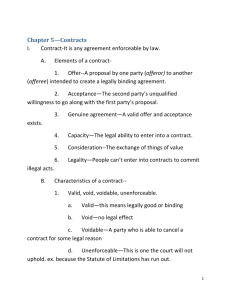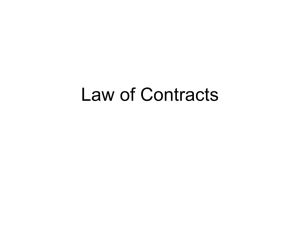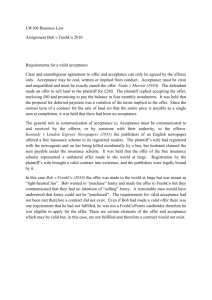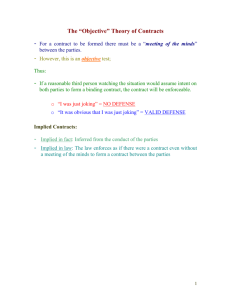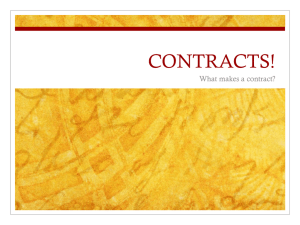Aug 25 2009 - The Origins
advertisement
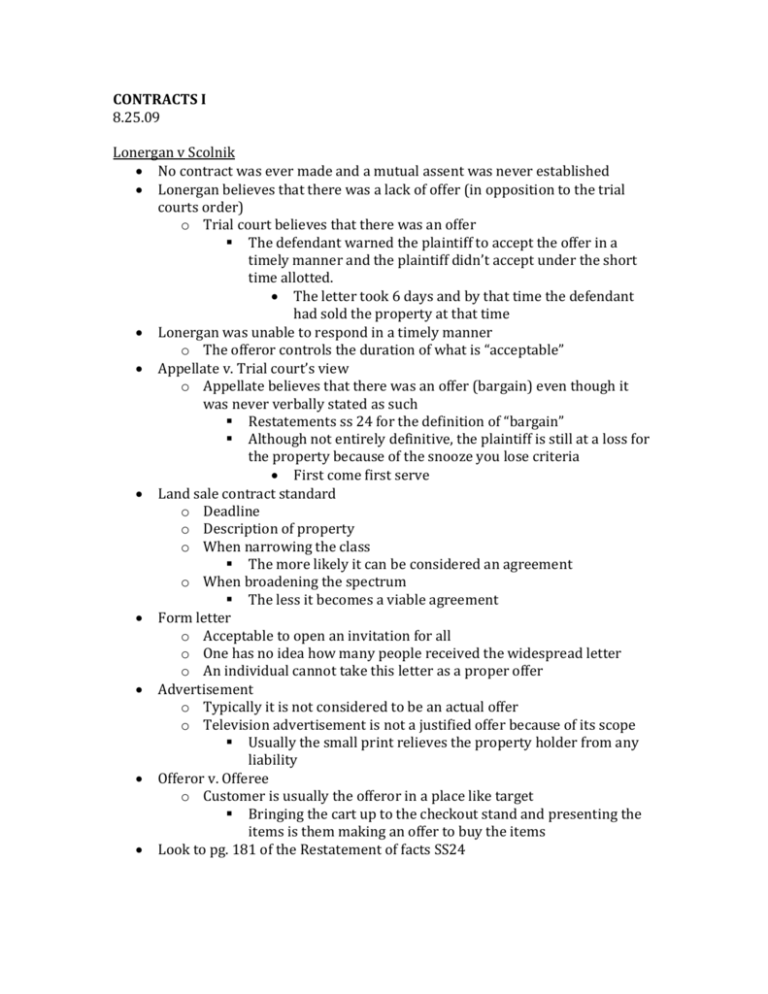
CONTRACTS I 8.25.09 Lonergan v Scolnik No contract was ever made and a mutual assent was never established Lonergan believes that there was a lack of offer (in opposition to the trial courts order) o Trial court believes that there was an offer The defendant warned the plaintiff to accept the offer in a timely manner and the plaintiff didn’t accept under the short time allotted. The letter took 6 days and by that time the defendant had sold the property at that time Lonergan was unable to respond in a timely manner o The offeror controls the duration of what is “acceptable” Appellate v. Trial court’s view o Appellate believes that there was an offer (bargain) even though it was never verbally stated as such Restatements ss 24 for the definition of “bargain” Although not entirely definitive, the plaintiff is still at a loss for the property because of the snooze you lose criteria First come first serve Land sale contract standard o Deadline o Description of property o When narrowing the class The more likely it can be considered an agreement o When broadening the spectrum The less it becomes a viable agreement Form letter o Acceptable to open an invitation for all o One has no idea how many people received the widespread letter o An individual cannot take this letter as a proper offer Advertisement o Typically it is not considered to be an actual offer o Television advertisement is not a justified offer because of its scope Usually the small print relieves the property holder from any liability Offeror v. Offeree o Customer is usually the offeror in a place like target Bringing the cart up to the checkout stand and presenting the items is them making an offer to buy the items Look to pg. 181 of the Restatement of facts SS24 Izadi v. Machado Ford According to lower court the advertisement was not considered to be an offer o The order was remanded and reverse by appellate court Since the offer was presumably misleading, the offer was viable o The customer intended to purchase the Ford Ranger under the provided deal The appellate court placed their judgment upon the Unfair Trade Practices Statute and established a reason through the plaintiff’s reasonable thought regarding the advertisement at hand Unfair Trade Practices Act Who is considered to be a reasonable person? o Does a reasonable person not have to read the fine print? o Was this ad more misleading v. the harrier jet? The discount is ridiculous to accept (50%) in this case but still more believable than possessing a harrier jet When making an offer Something becomes an offer when it’s accepted by an offeree What determines acceptance When one sends the return promise Mailbox rule o “When Acceptance Takes Effect” UCC SS 63 Unless the offer provides otherwise: (a) an acceptance made in a manner and by a medium invited by an offer is operative and completes the manifestation of mutual assent as soon as put out of the offeree’s possession, without regard to whether it ever reaches the offeror; but (b) an acceptance under an option contract is not operative until received by the offeror Acceptance is communicated once Recent developments of send/receive Once the offer is sent, the receiver does not need to be present or have read the offer but since it is in their possession, they are the holder and possessor o Offer is accepted once I receive it o One can determine the method of acceptance Once placed out of possession, the offeree must intend to send to the right place but if coincidentally it does not occur in such a manner, the court will probably not consider it as a form of acceptance Arguably o Making a Bilateral acceptance One promise and an acceptance promise o Counter offer Pg. 46 of casebook “A counter offer…the original offer.” Restatement SS39 Strict mirror image rule Material or significant

